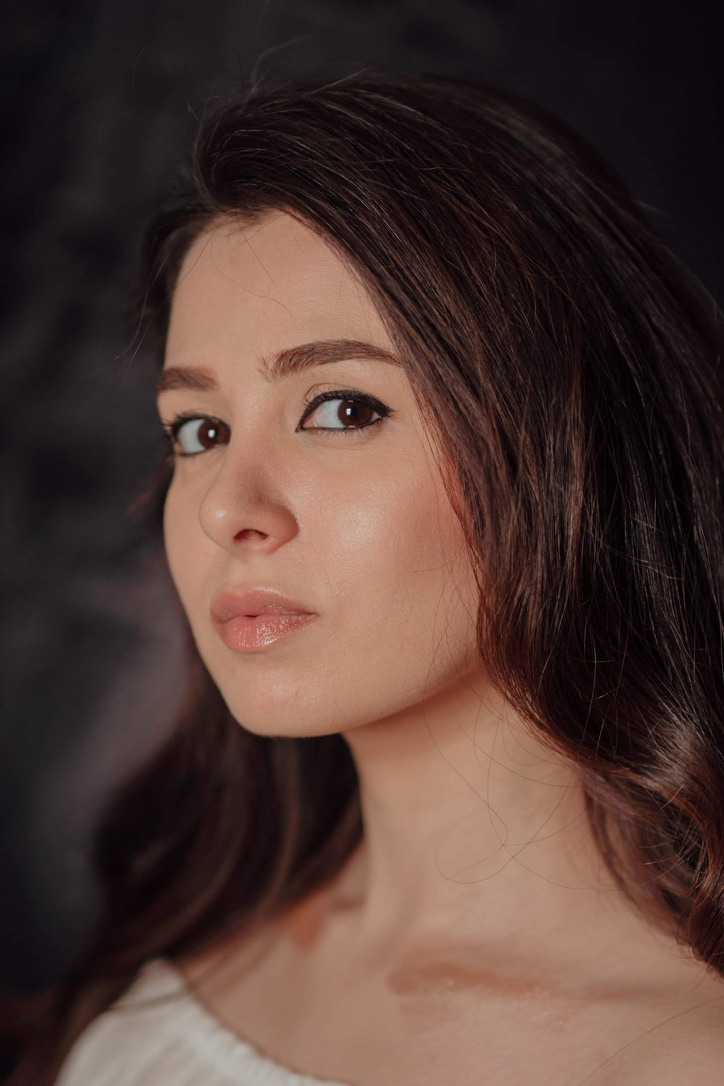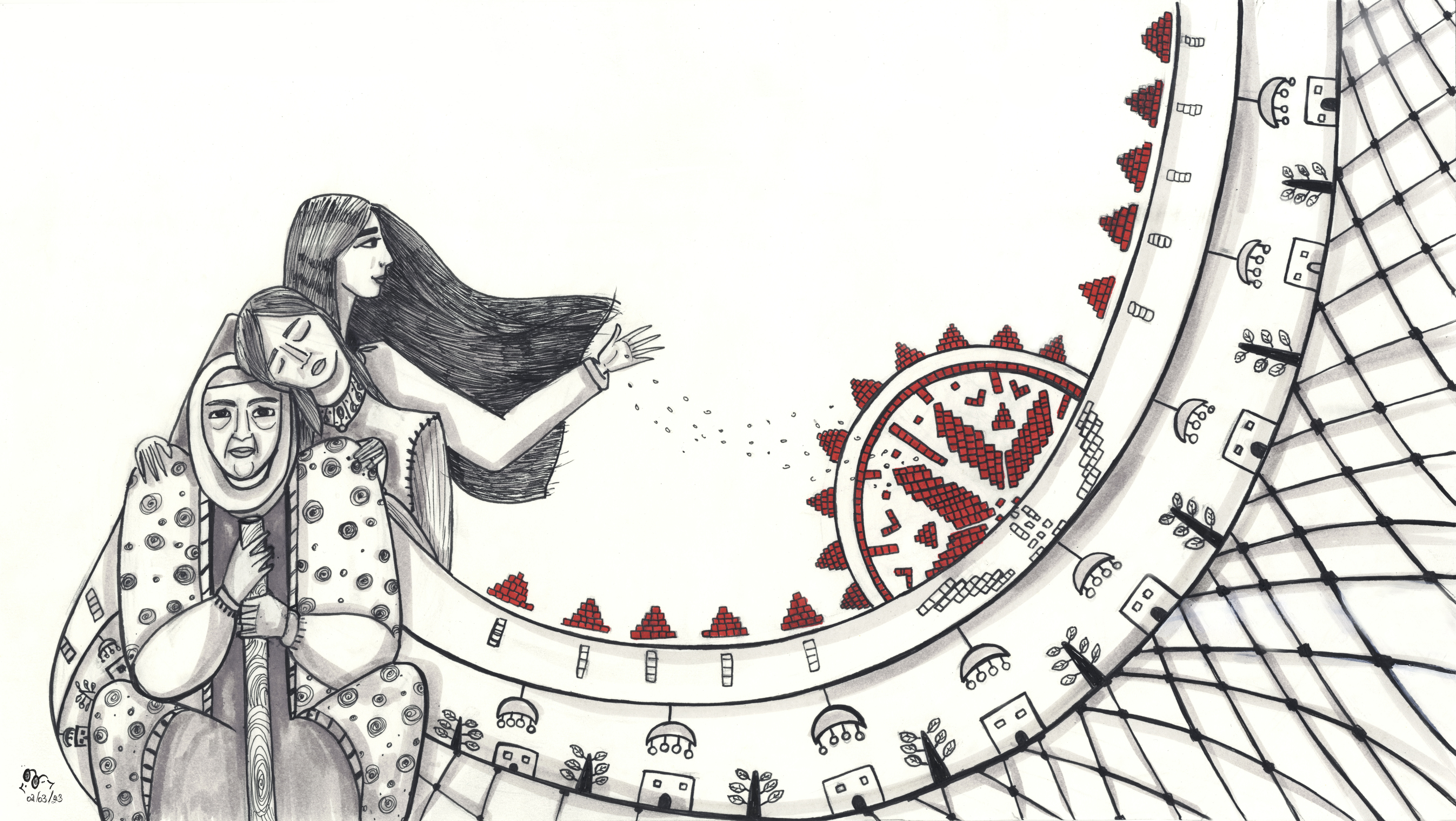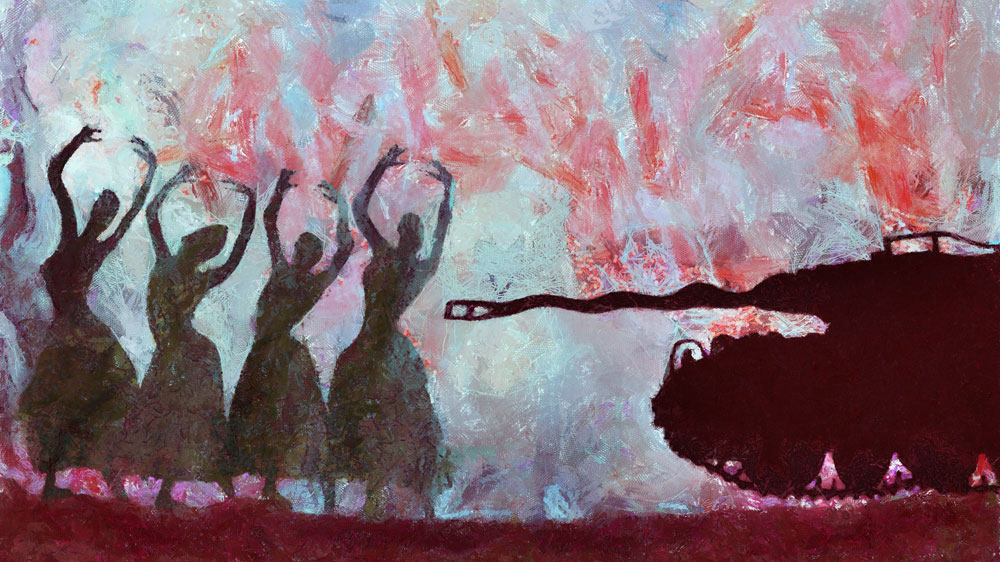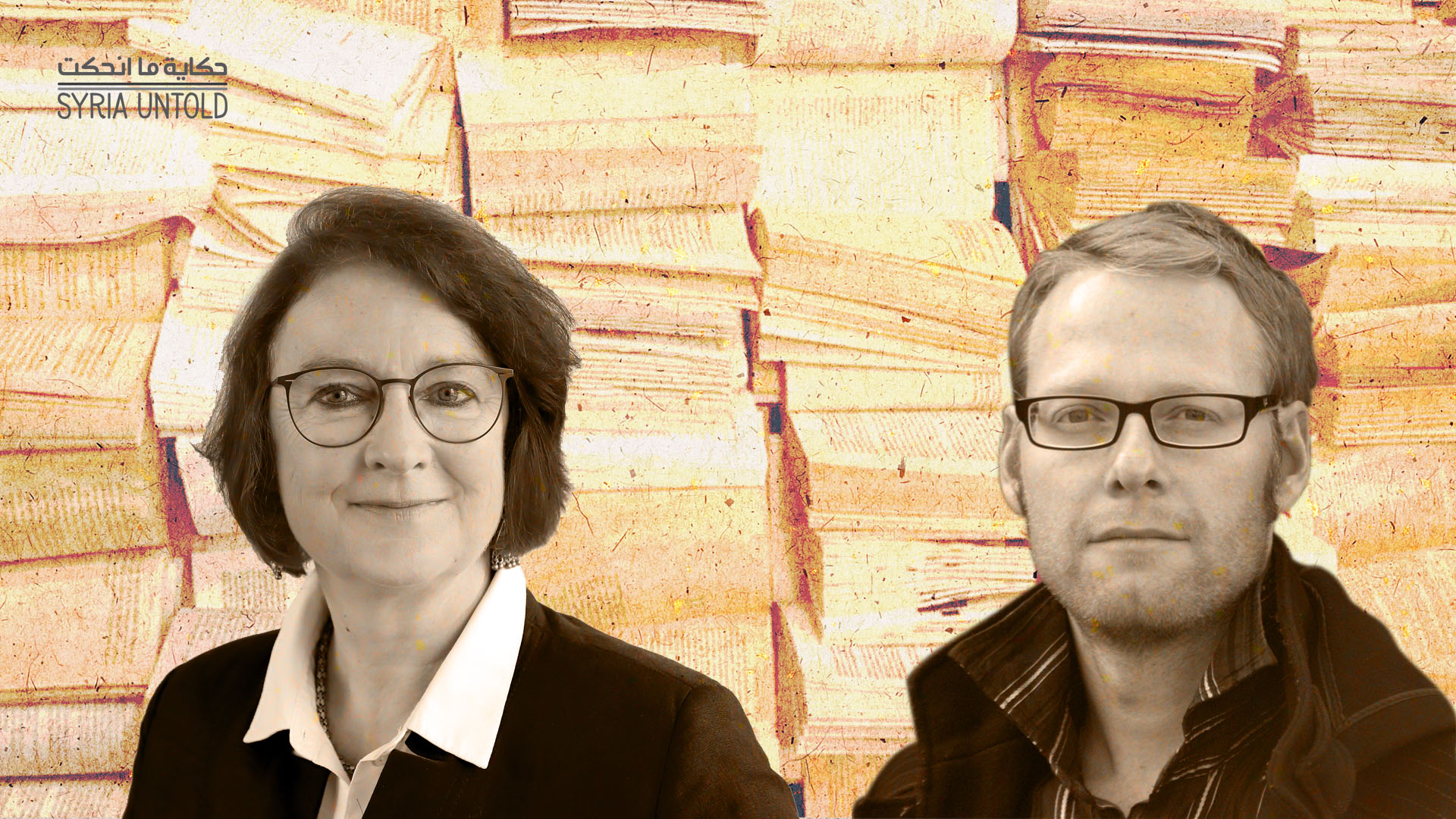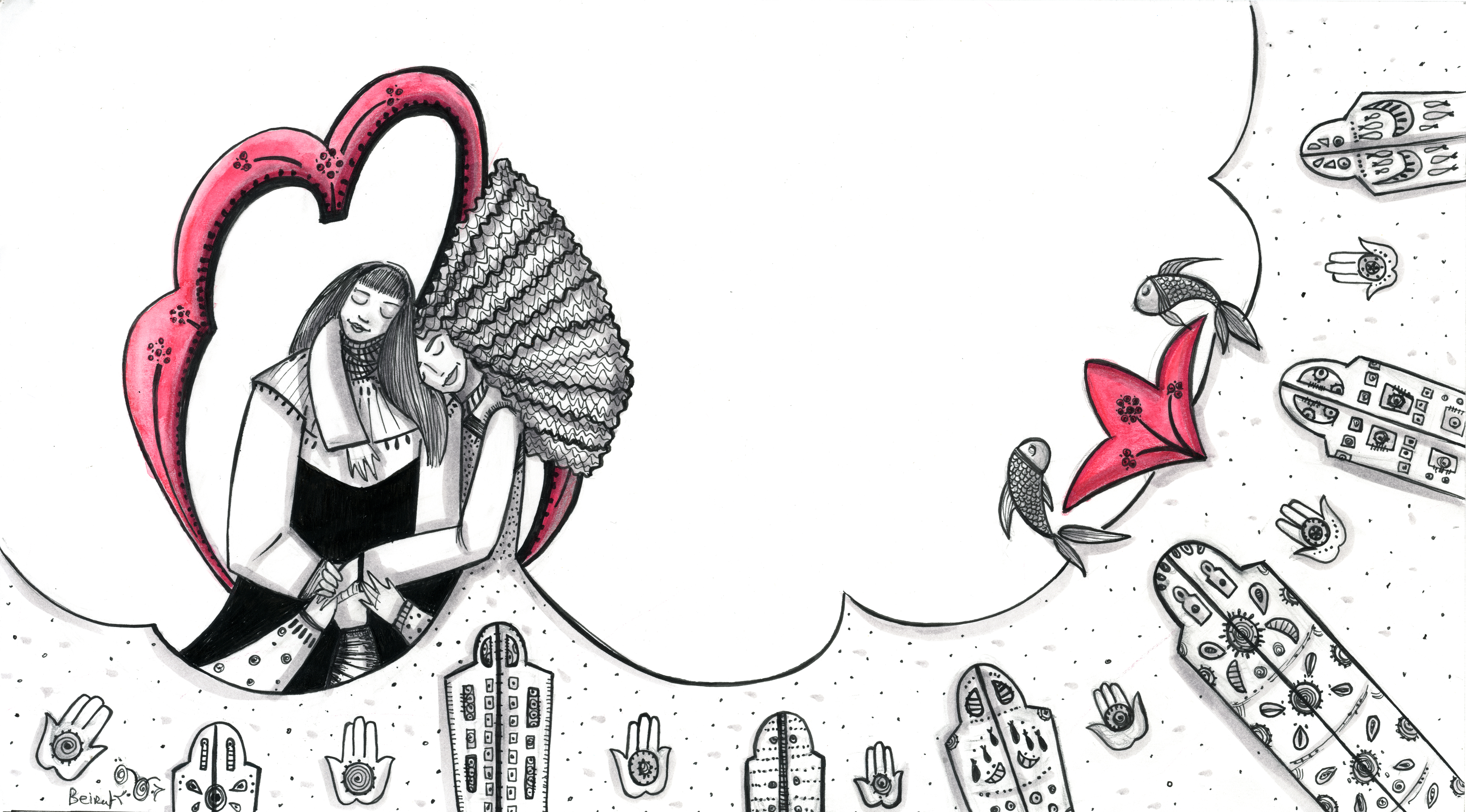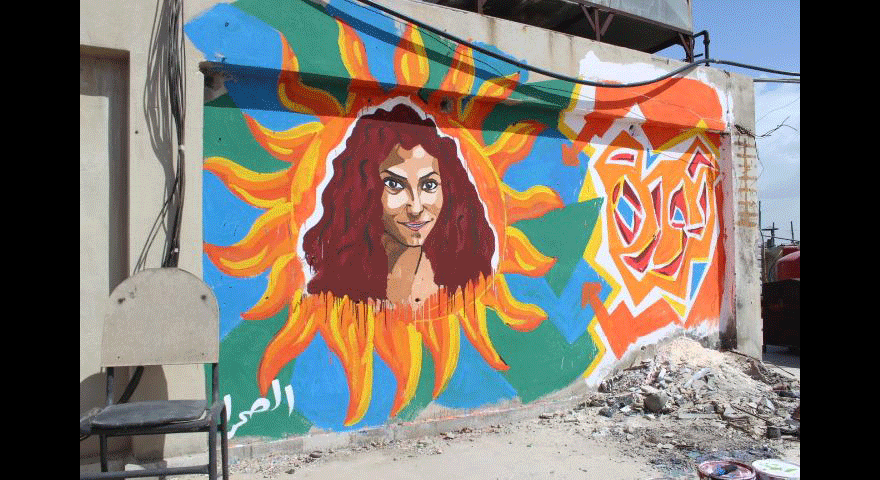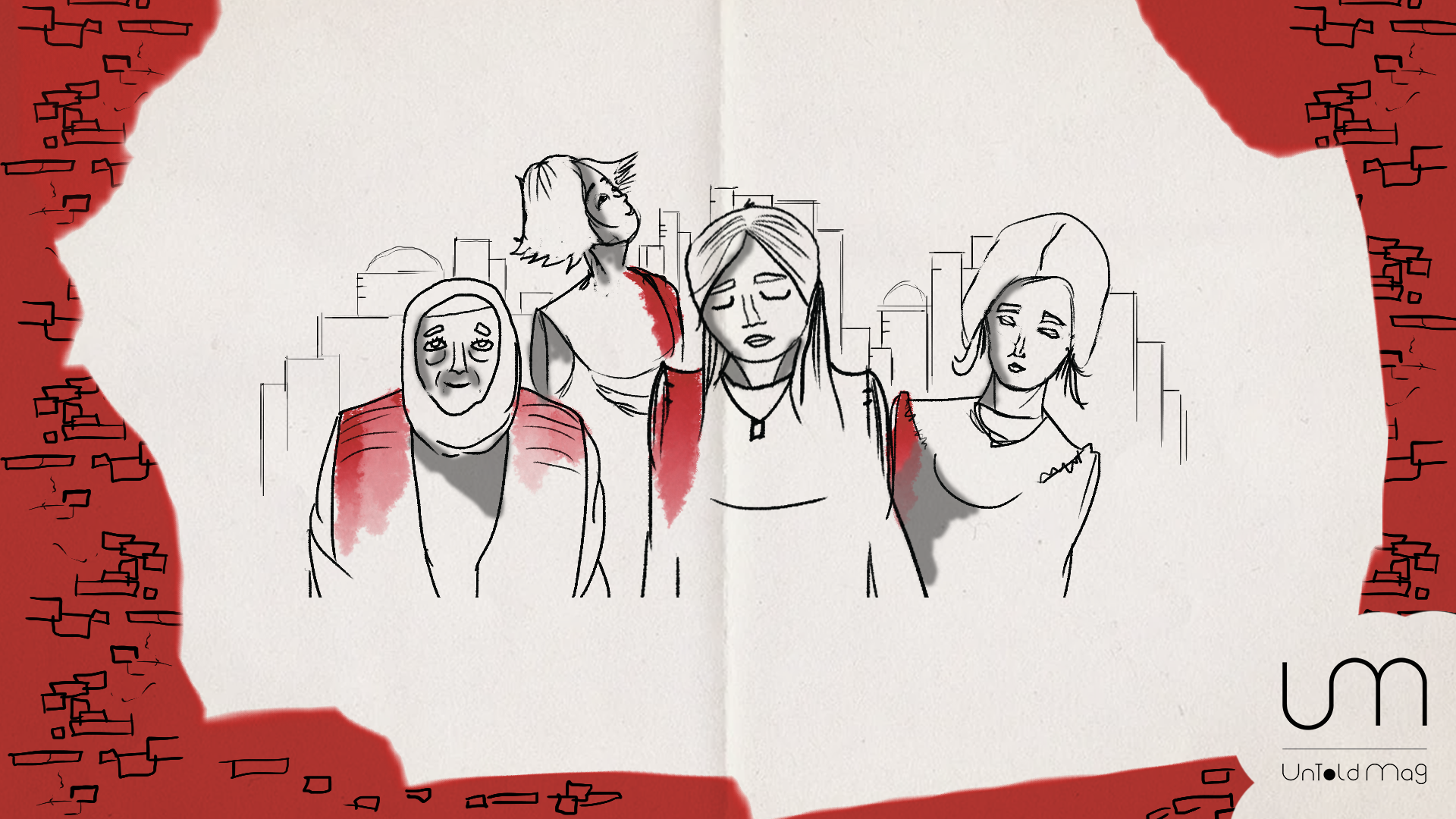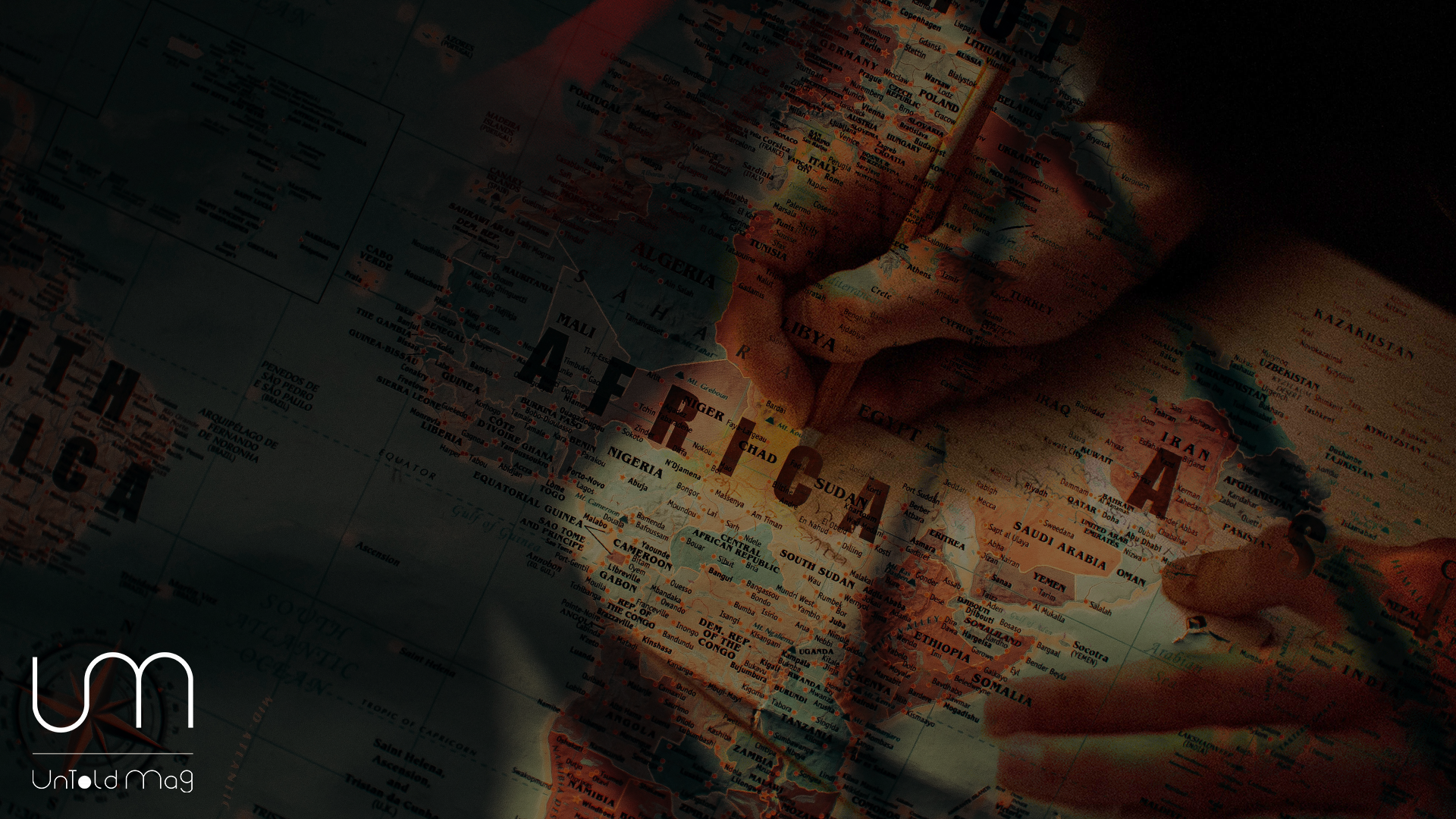Well, this is what the scene looks like from the inside: a bunch of angry feminists. Three? Or four? The number is not fixed; the replicas look identical from the outside, several foreheads with elevens between their eyebrows, puckered lips, and eyes ready to roll about something. There I am, yet comprising many versions of me. Each version is shouting at the other telling her: "Shut up, now it's not the right time."
In the following lines, I talk to myself, and to you, about my journey from feminist alienation to feminist schizophrenia. While the diagnosis and understanding of my alienation were quite rich and interesting, the schizophrenia seemed exhausting and frustrating. Not because this feeling of rupture or split was never told, but I was more looking for a pre-described feminist match that I easily found when I was just a feminist alienated from a patriarchal world. This is an attempt to bridge between schizophrenic feminists, to add one more layer to our understanding of the power structures within which we operate.
Wait until the regime falls; now it is not the right time.
I don't recall a moment of my life when I wasn't angry. It was not designated as anger in the past. I was being "insolent", "nervous", "grumpy", "nothing pleases her", and sometimes “rude”. I was feminist number 0. I always felt a rage, growing like a chili pepper at the top of my stomach. I don’t know when it sprouted, or how to calm it down. I am not sure what would later crush it and trigger it, pushing me to the thoughtless behavior, which would cost me a lot, and immerse me with an instant feeling of satisfaction that appears like a sin. This was the case since the early attempts to tame me in the Qubaisiyat preschool, and my clashes in middle school with the uniform supervisor, who is the civilian equivalent of the military trainer. It kept on growing with my abstention from the school march in support of Al-Assad, and my participation in the first demonstration against the regime in 2011 before I turned eighteen.
My Journey from Feminist Alienation to Feminist Schizophrenia
At the outbreak of the revolution, I did not identify myself as a feminist. I considered the gender distinction in human rights distracting and unnecessary. My idea was that we were facing a political system that oppresses women and men, our system would even oppress the insects. I used to think that we should get rid of the regime first, and see what we’ll do next. I defended this idea until the end of 2013. At the time, the despair regarding the regime's immediate fall began to flood my heart. I started to think that perhaps we could pay attention to the specificity of our oppression as women, because we are women. Of course, the voices of my male comrades started rising , saying, "It is not the right time, wait until the regime falls." It was a real battle, with myself first. I began to accept to define myself as a feminist. Feminist number 1 was recovering from the patriarchal depiction of her feminism. It was also a battle with the comrades, and the regime, our common enemy that produced this society against which I revolted in anger. It wasn’t a merciful front for a tenuous twenty-year-old girl.
Feminist number 1 was recovering from the patriarchal depiction of her feminism. It was also a battle with the comrades, and the regime, our common enemy that produced this society against which I revolted in anger.
After immersing myself in classical and less classical feminist readings, to diagnose my condition, I knew I was suffering from feminist alienation. This alienation is my feeling of separation from the patriarchal society around me, from the other who does not recognize my legitimacy. It was also a separation from my body and my voice, from my humanity who was never allowed to move outside the gender cage in which they put me since I became a big girl in Aleppo.
In her book, “Living a Feminist Life”, Sara Ahmed informs us that we can experience feminism as alienation. She explains how the process of recognizing the way our lives were shaped can be melded with our alienation. Yes, I quote Sarah as a classic "killjoy”, and I agree with her. The first feminist grew within me along my sense of feminist alienation. Everything around me was set up in a misogynistic way, both materially and morally, starting from politics and economics to pills and waist sizes, my waist size, and not the clothes. I think this is a common way to meet/get to know the feminist within us. Then, if everything around me is a stranger to me, let me change it to resemble me, and adjust it to my needs, easily.
Let me point out the obvious irony here, it wasn't easy. Through the revolution years, then the war, I was reduced to a miserable version of Paul Eluard's poem. I wrote violence on my notebooks and trees, on snow and warriors' weapons, on the kings’ crowns and the echoes of my childhood, over-enforced absence, naked solitude, violence, violence. I wrote violence, and I felt that I was born to name it, identify it, and put my life on hold waiting for it to pass.
At that moment, I longed for my friends at the girls' high school. We were rebellious and revolutionary. The Baathist educational system had not succeeded yet in breaking us collectively. I now know that every detail of our days was a form of feminist resistance, from the forbidden line of kohl in our eyes, to tightening our pink shirts around the chest, skipping the last hour of school, telling dirty jokes, or secretly smoking a cigarette. Our anger was productive, motivating, and incentive, and this is what I missed the most.
Throughout the years I spent in Aleppo, till the end of 2016, I was never invited to any physical feminist spaces, nor did I think at the time of inventing the spaces I missed, even on a small scale. I ran away to virtual spaces, real friends in a virtual space, to talk about survival, and nothing but survival. An escape from violence that sometimes slips through our fingers. This is what "The Bare Life" does to us. I neglected reading Agamben's arguments from a feminist perspective, but I understood it as a war person, whose political existence was mutated.
It was not easy to become a rebel woman in Aleppo. A conservative Syrian city immersed in patriarchy. I did not look like the other girls in my university or neighborhood. I had no energy to make the effort to find those who were like me beyond Facebook, and none of them were in Aleppo at the time. It was a cruel alienation, even from women who were not ready to give up the roles assigned to them since their birth.
This alienation resulted in physical social isolation. I spent my college years in an exaggerated solemnity. I wanted to be a perfect feminist, who gets great results, engages in intellectual debates and wins them, a "self-sufficient" woman that no one would encroach upon in her life. I was a "killjoy", but it was my own joy back then. As a result of everything we can endure in a war, I went through a series of anxiety attacks, insomnia, and depression. I didn't have the slightest luxury to stop, take a breath, and restore my mental health.
At the end of 2016, following angry outbursts and a revolution, which dragged me in a series of investigations and arrests threats, my family packed their belongings and moved to France. There, I will discover what it means to be a refugee, and I will get to know my active self, in exile.
It's not the right time now, enough! Or all issues are now timely, so what to do?
Since I set foot in France, I wanted to go back to Syria, but that’s not the point. Alienation was familiar to me, but it was legitimate here. It is called estrangement (ghorba), we feel it when in exile. I didn't find the romanticized exile of poetry and literature, I found what pushed me to say: "Ah! That's why exile was a punitive measure in the past." But "here", I have my say. I was able to publish what is happening in Syria without encryption, without any fear of arrest.
In the French countryside, I became obsessed with documenting. I felt that I left Syria with a memory that was not mine, a memory of our narrative. I had to write it, document it, engrave it in notebooks, and store it in electronic wallets. I was like a lunatic who thinks she's the last "survivor". This documentation coincided with Aleppo’s latest and most tragic forced displacement. I was watching videos and photos, reading testimonies, and going back to what I wanted to write. Here, a little feminist was born, let's call her feminist 2, buzzing constantly in my head, "It is not the time to talk about harassment at checkpoints."
Here, a little feminist was born, let's call her feminist 2, buzzing constantly in my head, "It is not the time to talk about harassment at checkpoints."
The rascal is right. Who cares about verbal and physical harassment we endangered at military checkpoints in Aleppo? People are dying, and their land is confiscated. We have to grab the international community by the collar, or get down on our knees and beg, in a less feminist initiative, for them to watch, care and act. Feminist 1 was arguing with her, reminding her of the huge effort we made to get rid of the toxicity of setting priorities that raises the battle’s voice and steps on women's issues. Conflict escalates, crushes the pepper at the top of my stomach, I curl up after a panic attack, and my anger produces nothing but nonsense.
In the first months, I was completely isolated, except for our daily trips to the hospital to accompany my mother on her cancer treatment journey, and my French lessons. I first dealt with the small community around me as an asylum seeker. This is how I identified myself, and how society labeled me on my forehead. I held onto the label, belonged to it, and felt that I was truly a refugee, with all the meanings it comprises, from oppression, inferiority, and political activism.
I classify myself as an intersectional feminist, but what intersects in Syria differs from what intersects in France. I remember attending lectures at universities and large institutions to practice the French language, and in a miserable attempt to overcome the idea of asylum. I remember leaning towards my sister during a seminar on immigrants. I told her that there were many women, and I was happy about that. To my right, an immigrant girl leaned over to her friend and said, "nothing but white heads!"
I classify myself as an intersectional feminist, but what intersects in Syria differs from what intersects in France.
So, I am a refugee, I have no voice in my country, and no one represents me in exile. Let the journey of restoring the political voice begin. At this point, it wasn’t the feminists in me who protested; it was the logic itself. Do you want a political voice before even having a voice to ask for directions? Yes, I will be an activist for refugees’ rights; it will not be an activism by choice. In the summer of 2017, feminist No. 3 was born. Her lens detects primarily racism, exclusion and marginalization based on legal status, skin color, and from a feminist perspective.
Feminist 1 didn't like feminist 3. The first time they met, she screamed: "it is not the right time”, until her throat exploded. People are dying in Syria, and this woman, aligned with the first world, wants political participation for women refugees. Isn’t stopping wars and the cause of asylum a priority? Feminist 3 is not much quieter; she wails loudly, in a way she has never before with any feminist. "Now is the time". While the depiction seems amusing, it is in fact an all-consuming psychological struggle, but to no avail. Again, the spaces for networking and encountering become limited when avoiding space under the whips of “it is not the right time”.
Feminist 3 is not much quieter; she wails loudly, in a way she has never before with any feminist. "Now is the time".
I consider writing on Facebook, I actually write, and then I mostly delete what I write. Do I tell my friends in Syria about racism in the French labor market? Do I talk with some Egyptian friends about the lack of access to mental and psychological care "here"? Do I talk with my refugee friends in Turkey about how much I miss Sabil Park? It is not the right time!
Feminist alienation did not leave me, but the constant quarrels of the feminist choir in me prevented me from giving legitimacy to any kind of feeling. It made me question my priorities, which were taking a horizontal turn, at the expense of the rest of my sanity.
My activism in France was divided into two activisms, a physical and "LinkedIn" activism, focusing on refugee issues from a feminist perspective, specifically mental health and professional integration. My second activism was a Facebook activism within virtual Syrian political organizations, addressing women’s role in building our miserable country’s future. From time to time, things got mixed up. For example, I became enraged in a French event, and asked people not to forget Syria and asylum causes. But the constant feeling of guilt was a common and continuous feeling at all times. It was the guilt of the survivor who does not know how to bring out the feminists in her, and use each of them to lead her own battle; she doesn’t know how her blessed anger explodes. For her, all issues are urgent, so what is to be done?
Slowly, this internal conflict was turning into a realistic external conflict, with the growing demonization of Syrian feminists everywhere: on the one hand, a demonization based on a religious heritage that raises His Holiness’s swords in our face; on the other hand, a fragile masculinity that does not miss an opportunity to accuse us of hysteria and extremism. When we talk about purifying daily discourse from sexism: they curse us. We talk about women's rights to own their bodies: they curse us. We expose harassers and rapists: they curse us. We talk about the rights of the LGBTQIA+ community: they curse us. We talk about shaping our own narrative: they curse us. Even if we talk about sports, they curse us. Not to mention the overheated debates about feminists' detachment from women's reality. The latter really confuses me, as if we are stripped of our femininity when we become activists for our rights. We have to defend ourselves against their contempt for others’ experience that highlights this alleged detachment. Should we act or fight to gain feminist legitimacy from all parties?
International Women's Day: Women on SyriaUntold
08 March 2019
What did exile change in our narratives?
26 January 2021
My feminism here was reduced to a witch's descendant. While the guardians of patriarchy are burning her, she would document, write and produce as a way to cry out epistemologically: "But I suffer from discrimination based on my gender!"
At a fateful moment, I decided to turn my French activism into a full-time job, in an association for refugees’ professional integration – a decision I will deeply regret. I lost my independence and my ability to express my opinions regarding the labor market. Moreover, I was in a toxic environment that wanted to benefit from employing a refugee, without making any effort to build a less white, more inclusive environment. It ended up with a job burnout, and me leaving the job. I suffered from bouts of depression that kept me in bed for several grueling months. I will not repeat this mistake; it was my decision based on my experience.
Featuring some kind of financial stability, I began to allow feminist 4 to whisper a little louder. She was born in a strange time with the coronavirus in 2021, the aforementioned work experience silenced her. One day, I heard her asking for permission to speak: "Will we talk about life beyond survival? Or is this not the right time? I understand if it is not." Feminist 4 has social anxiety. She is afraid of all the other feminists, who think she has no priority, nor will have any time soon. But it really makes me think. If feminist 0 belongs to the second wave of feminism, and feminist 1 belongs to the first wave, and feminist 2 wants to wail and mourn the war without belonging to any wave or school, and feminist 3 seems consistent with the third wave, so what does feminist 4 want? With whom does she sympathize and unite?
"I, I, I stand in solidarity with myself. I do not want to escape anything or run from something. I want to live." Feminist 4 makes the task of defending her a difficult one. I don't even succeed in meeting physically with other feminists around me to discuss and agree on priorities. I receive direct death threats when I talk about women's issues and the LGBTQI+ community, and feminist 4 has the audacity to raise the issue of life, real life whose essence is not survival. Is this really the time?
feminist 4 has the audacity to raise the issue of life, real life whose essence is not survival. Is this really the time?
Feminists 0, 1, 2, and 3 call feminist 4 white, and mock her white concerns. They find it easy to call her a traitor if she wants to participate in a hypothetical feminist discussion about pink taxes and free menstrual products. They blame her if she thinks of starting a feminist conversation with her partner about their duties and rights. We only tolerate feminist 4, the first-world feminist, when she talks about femicides in France, and perhaps a little when she criticizes sexist discourse in the media.
This same feminist falls apart when she receives news of a massacre or famine in Syria, while discussing issues related to being a woman in a first-world country: like the banal and important transportation strikes, workers’ rights, and nurses working conditions. The news hit her in the face and brought her back to point zero, to her bare feminism. “Maybe it wasn’t the right time?” “Maybe it will never be the right time?”
But weren’t our dreams to reach what privileged women have reached? Those who succeeded in obtaining their rights while having basic privileges? Why are we "comfortable" in a zone of limited quest for survival?
The news hit her in the face and brought her back to point zero, to her bare feminism. “Maybe it wasn’t the right time?” “Maybe it will never be the right time?”
Amidst the exhaustion of the feminist schizophrenia, usefulness and meaning become important drivers. Last week, I tried to explain to a white man, in a calm way that turned quickly into anger, why, as a white man, he cannot determine alone my needs as a refugee, and why I am so sensitive to non-refugees’ attempts to seize my activism. As I smoked one cigarette after the other, I asked myself, "Why?" The question of feasibility was urgent. What is the point of all this struggle and moving mountains? Will you have the opportunity to see the results of your psychological and political burnout?
I'm afraid to ask myself what happens if I wake up to find out that the sources of violence had magically disappeared from my life. What is the life I dream of, if I were not a rebel, a person of war, and then a refugee? What does it mean to be a woman when I remove the constant fight against something? These questions are not urgent given our reality, but they are essential to formulate specific demands, and make them achievable. In fact, I need to ask questions to revive the usefulness of my feminist struggle in all its forms, and to remember that I was born to name freedom, not violence.


